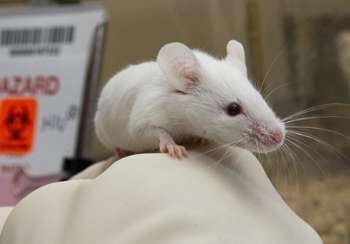Potent antibodies neutralize HIV and could offer new therapy, study finds

(Medical Xpress)—Having HIV/AIDS is no longer a death sentence, but it's still a lifelong illness that requires an expensive daily cocktail of drugs—and it means tolerating those drugs' side effects and running the risk of resistance. Researchers at The Rockefeller University may have found something better: they've shown that a therapeutic approach harnessing proteins from the human immune system can suppress the virus in mice without the need for daily application and could one day be used in humans to treat the disease.
Florian Klein and colleagues in Michel Nussenzweig's Laboratory of Molecular Immunology found that a combination of five different antibodies—proteins the immune system uses to fight infection—effectively suppressed HIV-1 replication and kept the virus at bay for a 60 day period after termination of therapy thanks to their longer half-life, while current antiretroviral drugs require daily intake.
These especially potent antibodies were only recently discovered, some of them by several of Klein's colleagues in the Nussenzweig laboratory. Called broadly-neutralizing antibodies, they were identified and cloned from HIV-infected patients whose immune systems showed an unusually high ability to neutralize HIV. In recent years the potent antibodies were found to prevent HIV from infecting non-human primates, demonstrating the possibility for a vaccine in humans. But they were thought to have little or no effect on established infections.
"Antibodies had been written off as a treatment for HIV/AIDS because previous studies showed only a limited effect on controlling the virus," says Klein. "But that was before these more potent antibodies were discovered. We wanted to readdress this question using these new tools."
HIV-1 is notorious for evading the immune system's attacks by constantly mutating, but the new antibodies are able to throw a wrench in that strategy. The key is in the combination. The antibodies target HIV-1's surface protein gp160, a large molecule that forms a spike that seeks out host cells and attaches to them. One antibody alone wasn't enough to quell the virus; neither was a mix of three. But five of them in unison proved too complicated for gp160 to mutate its way out of.
The researchers used "humanized" mice for the study, provided by Alexander Ploss in the Laboratory of Virology and Infectious Disease, because normal mice don't have the right receptors to be infected with HIV-1.
"Although HIV-1 infection in humanized mice differs in many important aspects from infection in humans, the results are encouraging to investigate these antibodies in clinical trials," says Klein. "It also may be that a combination of antibodies and the already established antiretroviral therapy is more efficacious than either alone," says Klein.
"If this could be used as a treatment one day, it is conceivable that patients would only need to take traditional drugs until the virus is controlled, and then receive antibodies every two to three months to maintain that control. We're eager to explore if a benefit in HIV-1-treatment can be achieved in humans."
More information: Klein, F. et al., HIV therapy by a combination of broadly neutralizing antibodies in humanized mice. Nature online, October 24, 2012. www.nature.com/nature/journal/ … abs/nature11604.html

















